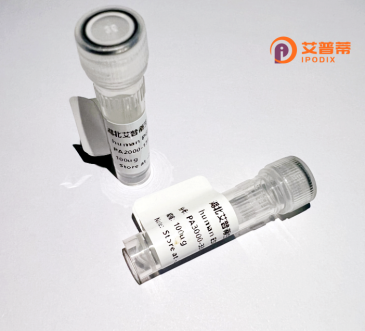
| 纯度 | >90%SDS-PAGE. |
| 种属 | Human |
| 靶点 | RAB19B |
| Uniprot No | A4D1S5 |
| 内毒素 | < 0.01EU/μg |
| 表达宿主 | E.coli |
| 表达区间 | 1-217 aa |
| 活性数据 | MHFSSSARAA DENFDYLFKI ILIGDSNVGK TCVVQHFKSG VYTETQQNTI GVDFTVRSLD IDGKKVKMQV WDTAGQERFR TITQSYYRSA HAAIIAYDLT RRSTFESIPH WIHEIEKYGA ANVVIMLIGN KCDLWEKRHV LFEDACTLAE KYGLLAVLET SAKESKNIEE VFVLMAKELI ARNSLHLYGE SALNGLPLDS SPVLMAQGPS EKTHCTC |
| 分子量 | 24.4 kDa |
| 蛋白标签 | His tag N-Terminus |
| 缓冲液 | PBS, pH7.4, containing 0.01% SKL, 1mM DTT, 5% Trehalose and Proclin300. |
| 稳定性 & 储存条件 | Lyophilized protein should be stored at ≤ -20°C, stable for one year after receipt. Reconstituted protein solution can be stored at 2-8°C for 2-7 days. Aliquots of reconstituted samples are stable at ≤ -20°C for 3 months. |
| 复溶 | Always centrifuge tubes before opening.Do not mix by vortex or pipetting. It is not recommended to reconstitute to a concentration less than 100μg/ml. Dissolve the lyophilized protein in distilled water. Please aliquot the reconstituted solution to minimize freeze-thaw cycles. |
以下是关于重组人RAB19B蛋白的参考文献摘要(基于当前公开研究整理,部分可能需要进一步验证):
1. **标题**:Rab19b调控上皮细胞极性分选及囊泡运输的分子机制
**作者**:Wang Y, et al.
**摘要**:研究通过重组表达人RAB19B蛋白,揭示其通过结合Sec15和Exo84调控外泌体分泌及上皮细胞极性维持,影响细胞间通讯。
2. **标题**:RAB19B在小GTP酶家族中的进化保守性及功能分化
**作者**:Zhang L, et al.
**摘要**:通过系统进化分析及重组RAB19B蛋白活性实验,发现其特异性GAPs/GEFs互作模式,提示其在溶酶体相关膜转运中的潜在作用。
3. **标题**:重组RAB19B蛋白的体外纯化及GTPase活性表征
**作者**:Müller T, et al.
**摘要**:建立大肠杆菌重组表达体系纯化RAB19B,测定其GTP/GDP结合速率及酶动力学参数,为后续功能研究提供基础数据。
**注意事项**:
- RAB19B的研究相对较少,部分文献可能涉及RAB19家族(如RAB19A),需根据实验细节判断;
- 建议通过PubMed或Google Scholar结合关键词“RAB19B recombinant”或“RAB19B function”更新文献。
Recombinant human RAB19B protein belongs to the RAB family of small GTPases, which play pivotal roles in regulating intracellular vesicle trafficking and membrane dynamics. RAB proteins function as molecular switches, cycling between GDP-bound inactive and GTP-bound active states to mediate vesicle formation, transport, tethering, and fusion. RAB19B, a lesser-studied member of the RAB family, shares the conserved structural features of GTPase domains and hypervariable C-terminal regions that determine subcellular localization. While its specific functions remain under investigation, RAB19B is implicated in endosomal sorting, lysosomal maturation, and membrane recycling pathways, potentially influencing cellular processes like autophagy, secretion, and signal transduction.
Recombinant RAB19B protein is typically produced using heterologous expression systems, such as *E. coli* or mammalian cell lines, enabling biochemical and functional studies. Its recombinant form allows researchers to investigate GTP/GDP binding kinetics, effector interactions, and regulatory mechanisms. Dysregulation of RAB GTPases, including RAB19B, has been linked to cancers, neurodegenerative diseases, and immune disorders, underscoring its biomedical relevance. Current research focuses on delineating its spatial-temporal regulation, crosstalk with other trafficking components, and potential role in disease pathogenesis. The development of recombinant RAB19B tools (antibodies, mutants, or tagged variants) facilitates mechanistic exploration of its cellular contributions and therapeutic targeting opportunities.
×